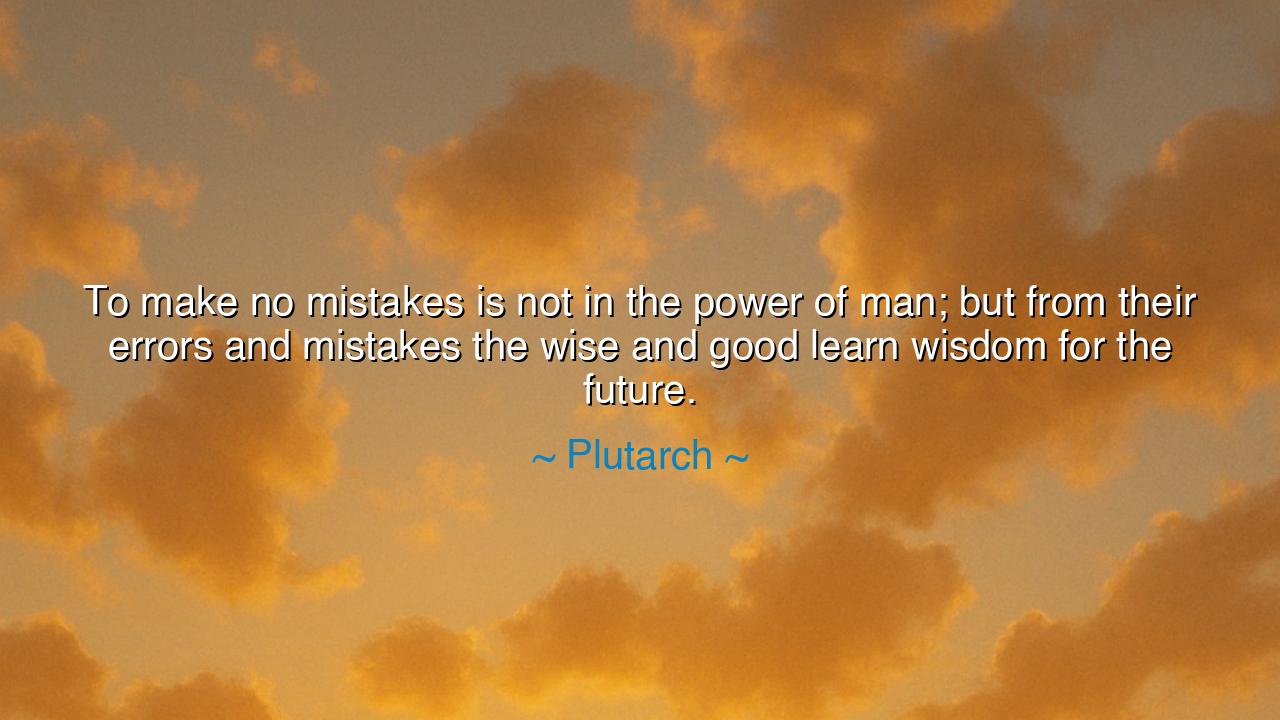
To make no mistakes is not in the power of man; but from their
To make no mistakes is not in the power of man; but from their errors and mistakes the wise and good learn wisdom for the future.






When Plutarch declared, “To make no mistakes is not in the power of man; but from their errors and mistakes the wise and good learn wisdom for the future,” he was reminding us of an eternal truth: that imperfection is inherent in our nature, yet it is through our mistakes that we achieve growth. No matter how noble our intentions or how careful our planning, mistakes are inevitable. And yet, it is in the wisdom we glean from these mistakes that the true measure of our character lies. Plutarch, in his reflections on the lives of great men, understood that it is not the absence of errors that defines greatness, but the ability to learn from them, to rise from failure and emerge wiser.
The ancients were no strangers to the concept of learning through failure. Consider the story of Alexander the Great, who, in his youth, experienced many defeats and errors before rising to become one of history’s most revered conquerors. Alexander’s mistakes on the battlefield were numerous, yet each failure was a lesson in strategy, leadership, and diplomacy. He did not succumb to despair but, instead, turned each failure into a stepping stone toward greater achievement. His story illustrates Plutarch's message: the journey to greatness is not defined by a lack of mistakes but by the wisdom one gains in overcoming them.
In the life of Socrates, we see another example of how wisdom is cultivated through the acknowledgment of error. Socrates, the philosopher who questioned everything, often admitted to his own limitations and mistakes. He was not afraid to appear vulnerable or ignorant, for he knew that true wisdom came not from claiming infallibility, but from embracing the lessons found in one’s own flaws. Socrates famously said, “I know that I am intelligent because I know that I know nothing.” This humility in the face of imperfection was his strength, for it allowed him to continually learn and evolve, embodying the very essence of Plutarch's words.
The story of Thomas Edison, the inventor, also echoes this theme. Edison’s countless failed experiments in his quest to invent the lightbulb were seen by many as a series of mistakes, but he never saw them as failures. Instead, he viewed each error as a lesson, a necessary step toward progress. He is famously quoted as saying, “I have not failed. I've just found 10,000 ways that won't work.” His ability to embrace mistakes and extract wisdom from them eventually led to one of the most transformative inventions in human history. Edison’s life is a powerful reminder that mistakes are not marks of weakness, but indicators of progress.
Plutarch teaches us that growth is born from reflection. To acknowledge our mistakes, to look back upon them with the eyes of wisdom, is to begin the path of learning. The wise and the good do not shy away from their errors but confront them with the intention to understand, to improve, and to act with greater knowledge in the future. This principle of reflection is what separates those who stagnate from those who rise, for reflection turns mistakes into stepping stones, and those who reflect find that their errors do not define them but propel them forward.
Yet, there is a danger in mistakes that goes beyond their immediate consequences. To err is human, but to ignore the lessons of those errors is to remain stuck in the past. The good and the wise, according to Plutarch, do not repeat the same mistakes; they learn from them and change their course. This is not to say that we will never fail again, but that we can face each failure with greater strength and wisdom because we have chosen to learn, to adapt, and to move forward. Mistakes become lessons, and lessons become successes.
The lesson we take from Plutarch’s words is clear: embrace your mistakes, for they are not the end but the beginning of wisdom. Do not fear failure, but learn from it. Let your mistakes be the foundation of your growth, and let your future be shaped by the lessons of your past. In this way, mistakes become not something to regret but something to be grateful for, for they are the teachers that show us the path to true wisdom.
So, as you journey through life, take heart in your mistakes. Reflect on them with honesty and courage, and know that the wisdom you gain from your errors will light your path forward. Like Alexander, like Edison, and like Socrates, be brave enough to learn from the errors of your past, for the future belongs not to those who make no mistakes, but to those who grow from them and use that growth to shape the world ahead. Mistakes are not your downfall—they are your stepping stones to greatness.






AAdministratorAdministrator
Welcome, honored guests. Please leave a comment, we will respond soon